
Patriot Preschool, for children 3 years old, is an excellent way to prepare them for success in our K4 and kindergarten programs. Students learn to listen, follow instructions, and interact socially with their classmates. Songs, rhymes, stories, and challenges are used to create a fun learning environment. Bible stories and songs are used to teach the truths of God’s word and the foundations of a Christian worldview.
A safe environment with caring teachers provides the framework for academic, physical, spiritual and social activities. Spiritual activities include weekly chapel, daily Bible lessons, character development lessons, and relating the wonder of God’s creation in reading enrichment time, their science units, and daily interactions. Music is integrated into lessons through the curriculum and chapel. Social development is encouraged during a daily playtime, recess, and units in social studies that help the children become aware of the community around them.
Field trips are an essential part of a pre-kindergarten’s learning experiences, such as a trip with their class to a working farm.
The morning pre-school takes place from 8:10 to 11:30 a.m. If a full day is chosen, students stay until 3 p.m., which includes lunch, recess, a rest/nap time, and enrichment activities before they are dismissed to go home.
If you are looking for information about our Kindergarten program (K5), click here.
Calvary Christian School offers a morning pre-kindergarten for four-year-olds (K4). A safe environment with caring teachers provides the framework for academic, physical, spiritual and social activities. Academically, the children have reading readiness lessons, science units, language skills, and math concepts, such as counting to 100. They also learn number and shape recognition, math readiness skills, phonics sounds, and letter recognition. The pre-school children learn to blend the sounds and begin reading one and two vowel words by spring.
Art and writing activities, gym time, and recess help develop fine and gross motor skills that contribute to physical development.
Spiritual activities include weekly chapel, daily Bible lessons, character development lessons, and relating the wonder of God’s creation in reading enrichment time, their science units, and daily interactions. Music is integrated into lessons through the curriculum and chapel. Social development is encouraged during a daily playtime, recess, and units in social studies that help the children become aware of the community around them.
Field trips are an essential part of a pre-kindergarten’s learning experiences, such as a trip with their class to a working farm.
The morning pre-school takes place from 8:10 to 11:30 a.m. If a full day is chosen, students stay until 3 p.m., which includes lunch, recess, a rest/nap time, and enrichment activities before they are dismissed to go home.
Interested families may call 843-650-2829 for further information and/or to schedule a tour.
If you are looking for information about our Kindergarten program (K5), click here.
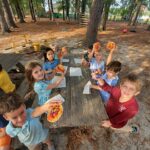 Calvary Christian School offers Patriots Club, our after-school care program, for those who need a full day at school (2:30 p.m. or 6 p.m. pick-up). The program is directed by qualified and licensed staff and includes time outside, time to work on schoolwork, and time for crafts and other activities. Additional registration and fees apply.
Calvary Christian School offers Patriots Club, our after-school care program, for those who need a full day at school (2:30 p.m. or 6 p.m. pick-up). The program is directed by qualified and licensed staff and includes time outside, time to work on schoolwork, and time for crafts and other activities. Additional registration and fees apply.
There are also various after-school programs offered as part of our Arts/Activities After School Program that students can sign up for, whether they are enrolled in Patriots Club or not. Some students might also enjoy trying our JumpStart Sports program, led by office manager Ms. Kathy.
View and download the 2025-2026 Patriots Club registration form here.
 All students have the opportunity to perform at special events throughout the year, including Grandparents Day and some winter/spring fine arts concerts.
All students have the opportunity to perform at special events throughout the year, including Grandparents Day and some winter/spring fine arts concerts.
There are additional, optional music programs that students can enroll in, including Kindermusik and private music lessons. Click here for more information on our fine arts opportunities.
There is also our Arts/Activites After School program, which offers a variety of activities led by one of our teachers. Options vary by quarter and may include watercolor classes, cooking classes, archery, fun with LEGOs or slime, woodcrafting, and more.
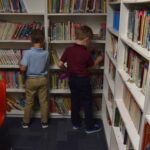
All K3 and K4 students spend time in the school library with our librarian each week for storytime and time to explore our collection of books.
The library collections are separated by grade and reading level for easy access, and a number of beginner board books are available for our preschoolers.
Recess is considered an important time for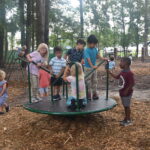 all K3 and K4 students to develop and cultivate growing minds and bodies, as well as social and behavioral skills. The Calvary playground has recently been updated with new equipment, including a small basketball court, a soccer field, new swings, and additional jungle-gym equipment.
all K3 and K4 students to develop and cultivate growing minds and bodies, as well as social and behavioral skills. The Calvary playground has recently been updated with new equipment, including a small basketball court, a soccer field, new swings, and additional jungle-gym equipment.
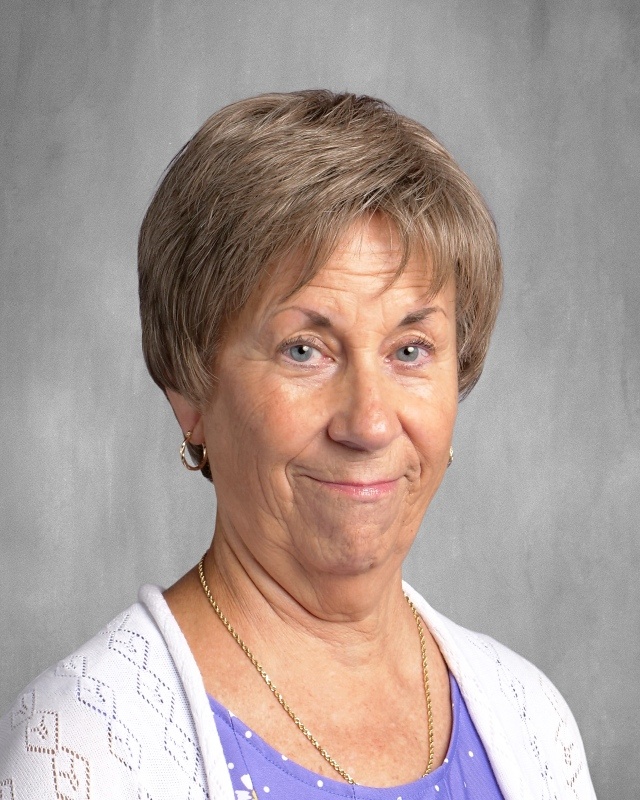
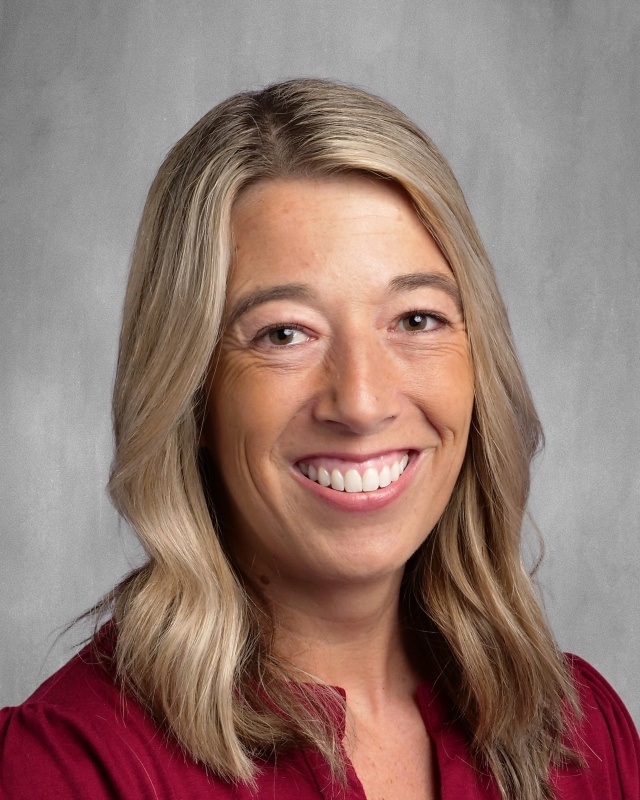
"To come to work every day and spend time with all of my littles, I think I am teaching them, but really it's quite the opposite!" she says. "I learn so much from them each and every day."
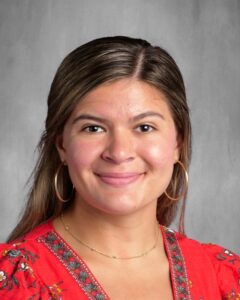

Our Patriot Preschool program is specifically designed to prepare children for success in kindergarten. It is academically advanced and accelerated to ensure an easy transition into kindergarten. Learning is fun and exciting at this age and the children are motivated through songs, challenges, and games. Curious minds are challenged by exploration into new ideas and concepts.
Phonics – As the year progresses, the children learn 44 basic sounds of the English language and apply their phonics skills to reading. Guided activities teach these young learners initial letter sounds and alphabet recognition. Phonemic awareness happens through practice, drill, and reinforcement. Children learn to read using a phonics based program.
Handwriting – These little ones will learn correct pencil holding position and paper placement. They will also learn to print upper case and lower case letters a-z and numerals 0-20. Activities teach many pre-writing skills, left to right, vertical, horizontal, diagonal, and curved line tracking.
Mathematics – Through various activities these “little ones” learn numbers, shape recognition and pattern sequencing. Measurement vocabulary is used to teach calendars, clocks, and coins.
Bible – Four-year-olds discover how to think, grow, know, and live “God’s way.” Through Bible lessons, character stories, Bible verses, and memory work, the children learn Bible truths and how to apply those truths to their young lives.
Electives – Art, music, and library are offered on a weekly basis.
Extras – Traditional literature, realistic and fanciful prose, and poetry help develop good listening skills as well as vocabulary development and enrichment. Craft activities, songs, musical games, and stories are used to teach many of the heritage studies and science themes. Children learn concepts of God’s plan for the child and his family. Holidays, community helpers and patriotism are used to develop many exciting activities. Young learners study seasonal earth, plants, and animals. They enjoy activities which relate to seasons, family and the farm. Academic time is enriched through the use of interactive white boards.
Our teachers include a daily Bible lesson, including songs, Bible stories, and scripture verses. Teachers also use this time to present life application lessons that connect to children’s lives in a meaningful, age-appropriate way. In all of our curriculum, we pray that God will be perceived as our creator and in control of our lives and universe.
Each preschool child is expected to follow the directions and instructions of his teacher. To encourage proper behavior, teachers employ a variety of positive rewards (verbal praise, notes and phone calls home for good behavior, and class rewards).
Likewise, teachers may also use a variety of methods to deter students from improper behavior. These methods will vary depending on the classroom, but their ultimate goal is to encourage students toward right and proper Christian behavior.
These disciplinary actions may include, but are not limited to, loss of recess, loss of rewards, verbal rebuke, notes or phone calls to the parents, or discussion with the principal.
Classroom Teacher
Students are guided by their teacher’s classroom management to promote appropriate behavior for the activity and for the learning environment. Inappropriate behavior is remediated through disciplinary actions in the classroom and parents are notified.
Elementary Supervisor
Students are referred to the elementary supervisor when their behavior in the classroom is consistently inappropriate and classroom remediation is not effective. Additional remediation and disciplinary action takes place and parents are notified.
School Administrator
The school administrator oversees all disciplinary actions made by the teacher and elementary supervisor. If the student continues to reject the guidance and corrective action given, the School Administrator takes further disciplinary action regarding suspension and dismissal.